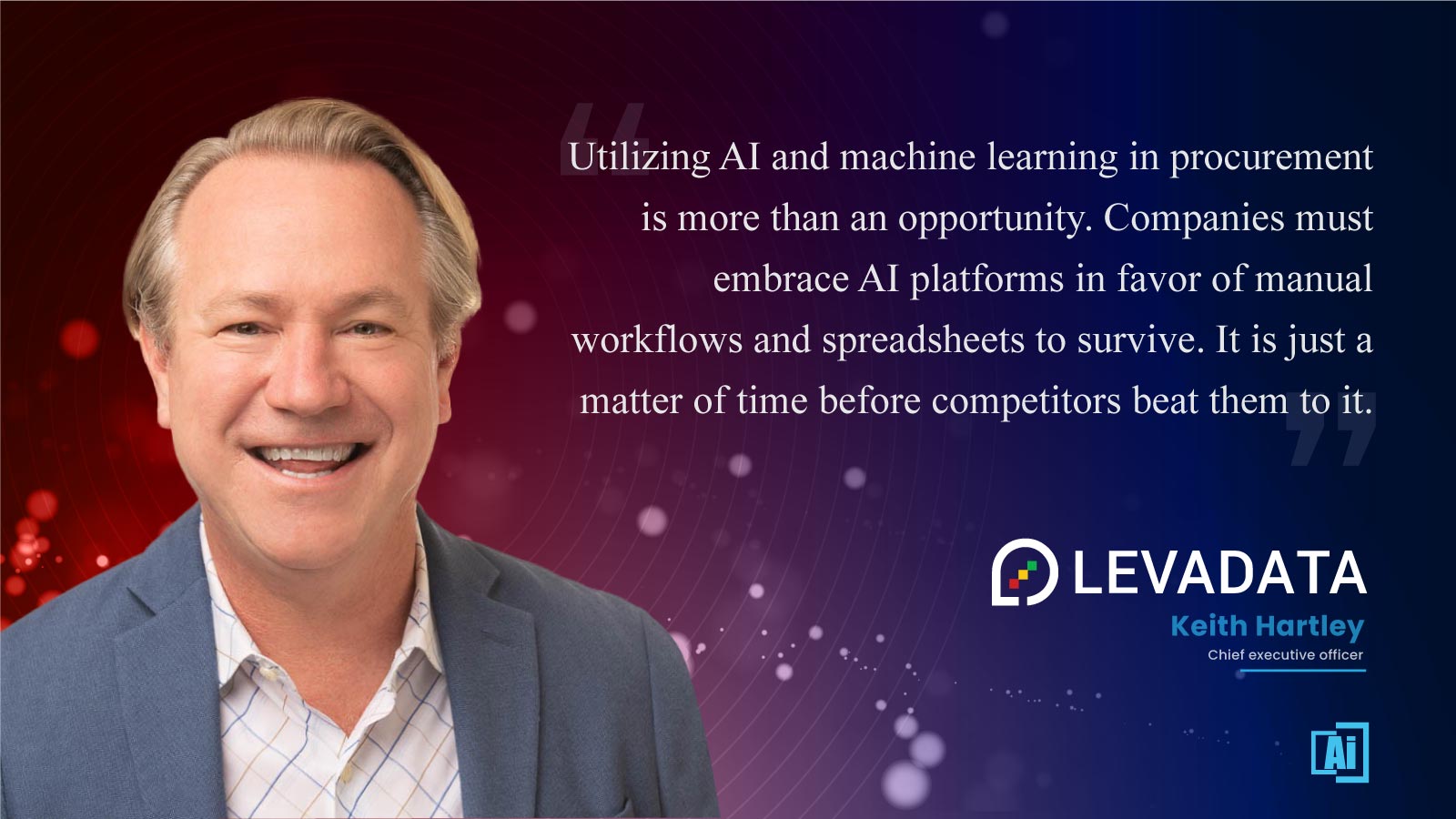AiThority Interview with Keith Hartley, CEO of LevaData

Please tell us a little bit about your journey and what inspired you to start at LevaData.
I joined LevaData as its new CEO in November 2022 and brought with me a deep background in supply chain and manufacturing technology solutions. From direct and indirect procurement, supply chain planning and execution, sourcing, and e-commerce, I most recently led go-to-market and sales teams at Blue Yonder and iValua. Because of my extensive experience working with global manufacturers, I understand the data challenges these companies face to effectively do their direct material sourcing. All this experience has culminated in the timely opportunity to transform how companies’ source direct materials, and I believe LevaData will play a critical role in fueling economic vitality and health for all global supply chains.
Tell us about the enterprise-level supply chain ecosystem that you are currently focusing on and how it changed over the last three years. How did the pandemic change the landscape?
Since 2020, supply chain and procurement teams have faced multiple challenges with the pandemic disrupting the “just-in-time” system our globalized supply chain relied upon.
In 2022, we saw new supply and demand disruptions caused by geopolitical unrest, persistent inflation, and rising prices. Again, procurement teams had to scramble to manage costs and suppliers, as demand and supply shifted rapidly.
Between the supply shocks and increasing pressure on teams to get a handle on spending, the last three years have been turbulent and uncertain. Now, amid a looming recession and widespread layoffs in the tech sector, workers are faced with doing more with less as they are left to do the work of former colleagues.
AI-powered supply management platforms that bring companies increased data intelligence and decision-making insights are critical to addressing all this turmoil. Now more than ever, customers are looking to technology to help them find the millions in savings they are expected to deliver amid unprecedented market volatility. Technologies, especially AI and machine learning, are the primary ways to augment existing teams without adding headcount, and they drive significant cost savings while ensuring supply continuity.
What are your core offerings? How do you incorporate various advanced technologies to create your products for large and mid-sized companies?
LevaData’s platform and proprietary technology are built on AI and automation, aggregating and contextualizing data to help supply chain, procurement, and product teams make better decisions faster. The company is reinventing how direct material sourcing is done, arming teams with the insights and intelligence they need to do their work with higher velocity and greater accuracy and results. This is the future of supply chain sourcing in action today. Core capabilities of the platform include:
-
Rule-Based Automation
Rule-based automation makes supply chains smarter and quicker and shortens the time to value. Teams can set up their parameters, and intelligent AI-powered algorithms work in the background to identify and alert users when the criteria are met.
LevaData customers set rules to automatically do things such as the following:
- Exclude opportunities below a certain dollar value.
- Automate review rules to process future savings opportunities.
- Automatically reject inferior opportunities or identify cost savings above a threshold.
Event Monitoring
The hallmark of LevaData’s platform is the volume and variety of aggregated and contextualized data. Tapping into data from internal and external sources, the AI-powered platform proactively monitors and alerts users when something changes so decision-making happens faster.
Here are some of the ways LevaData incorporates event monitoring:
- Automated market analysis by the commodity group provides direct cost benchmarks for standard parts.
- It automatically identifies opportunities in the part spend and suggests alternate matching parts, manufacturers, and supplier diversification opportunities.
- It automatically identifies materials and commodities sourcing opportunities based on internal pricing against market benchmarks and market trends.
- It continually monitors portfolio risk for end-of-life parts.
Supplier Management
LevaData’s platform streamlines supplier management, reducing time spent on negotiation prep and bid analysis by as much as 80 percent. The platform recommends strategies that maximize negotiation outcomes, so new employees can ramp up quickly and see the same results as seasoned professionals.
Here are some ways customers use LevaData to apply automation to supplier management:
- Generate negotiation playbooks.
- Receive future target cost estimates.
- Identify part providers with a lower price.
- Global commodity managers build negotiation strategies while automating the quoting process.
What is the opportunity for organizations when it comes to utilizing AI and machine learning in their operations?
I see AI-powered platforms as a necessary digital transformation that companies must adopt to adequately manage future supply chain disruptions. I firmly believe there is no better time for procurement to lead the charge and transform how sourcing is done across an organization. Utilizing AI and machine learning in procurement is more than an opportunity. Companies must embrace AI platforms in favor of manual workflows and spreadsheets to survive. It is just a matter of time before competitors beat them to it. I call this the decision abyss, with procurement, supply chain, and product teams continuing to struggle to obtain the insights they need to generate cost savings and ensure supply continuity. The decision abyss continues to grow between companies that have AI platforms and the dynamic insights they provide and those that do not. Those that embrace AI and automation will find millions in cost savings from insights and avoided risks. This will increase their speed-to-market and generate higher productivity and job satisfaction for their teams.
Top AI ML Insights:
AiThority Interview with Anthony Katsur, Chief Executive Officer at IAB Tech Lab
ChatGPT and Google’s Bard have taken the tech industry by storm. Could you let us know how generative AIs could transform integrated supply management?
Thanks to ChatGPT and Google’s Bard, AI is being closely watched right now. As powerful and interesting as these new technologies seem, I believe AI will augment procurement teams, not replace them. AI insights enable procurement to immediately make the best decisions, empowering people to focus on negotiations with suppliers and partnering with other functions in the company. AI-powered platforms can provide procurement with new sources of value that humans cannot access on their own.
For these reasons, I see AI-powered platforms as a necessary digital transformation that companies must adopt to adequately manage ongoing and sometimes concurrent supply chain shocks. AI-powered products will continue to improve, offering even more value. I firmly believe there is no better time for procurement to lead the charge and transform how sourcing is done across their organization. Companies that replace manual processes and spreadsheets with AI platforms will survive to shape the future. Those that lag will not compete.
What are your views on the future of supply chain optimization with ChatGPT and other AI techniques?
ChatGPT is a great example of how AI is being used to accelerate human output. It isn’t replacing people; it’s helping them do their work faster. However, the real power of AI tools like ChatGPT is data. Data lies at the heart of AI technologies. By feeding in volumes of a wide variety of data and then using AI to provide context for actionable insights, we can obtain information that could not be surfaced using any other method. In the future, instead of simply using data, we will interact directly with data through AI. For example, imagine conversing with an AI platform to query real-time insights in a very dynamic way. Soon we’ll come to think of AI as a digital colleague that we interact with to make better decisions faster.
Do you foresee any challenges brands will deal with because of AI-based supply chain automation?
One of the challenges for companies new to AI is the lack of understanding of how AI fits into a user’s workflow. Some think it is just hype and delay implementing new solutions. Others implement it without reimagining procurement within the organization.
In other words, AI is transformational, and that includes reexamining workflow processes. Training opportunities aligned to new roles and responsibilities are just the start. Change communications and new cross-departmental collaboration augment the impacts of AI-based supply chain automation. However, these activities only work if organizations embrace the vision for how AI platforms can truly transform their business.
Recommended:
AiThority Interview with João Graça, Co-founder and CTO at Unbabel
Thank you, Keith! That was fun and we hope to see you back on AiThority.com soon.
Keith is a global supply chain thought leader and CEO of LevaData, with a proven track record of strategic planning and business execution in the enterprise software space, most recently as SVP of Sales at Ivalua. Prior to that, Hartley led all manufacturing sales at Blue Yonder, with responsibility for verticalizing the go-to-market operations for the Americas region. He has also held senior sales leadership position at Oracle Corporation and other leading software
 LevaData’s integrated, AI-powered supply management platform is transforming direct material sourcing and enabling companies to manage costs while reducing risk. We power the smartest supply chains in the world by constantly analyzing business objectives against real-time market activities and community intelligence. We are trusted to deliver improved margins, control risks, generate new product velocity, and achieve multi-tier supplier engagement with purpose-built tools for quick collaboration and decisive actions.
LevaData’s integrated, AI-powered supply management platform is transforming direct material sourcing and enabling companies to manage costs while reducing risk. We power the smartest supply chains in the world by constantly analyzing business objectives against real-time market activities and community intelligence. We are trusted to deliver improved margins, control risks, generate new product velocity, and achieve multi-tier supplier engagement with purpose-built tools for quick collaboration and decisive actions.
LevaData provides companies with a competitive advantage through transformational, predictive insights. Our customers include large and complex enterprise companies and small- and medium-sized OEMs seeking to achieve best-in-class supply management practices.

Comments are closed.